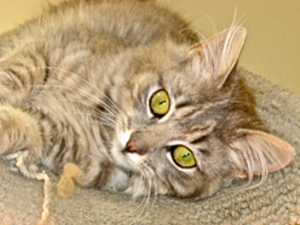Misconceptions about the FIV+ diagnosis are the only thing standing between cats like sweet Gabby and loving adoptive homes.
Photo by Jane Warshaw
Positively Adorable. Absolutely Adoptable.
Great looking cats and kittens — like 11-month-old Gabby — are stuck in shelters or with rescue groups. She's gorgeous. She's affectionate. And she's going nowhere. All because she has tested positive for the FIV virus and people have a lot of misconceptions about FIV+ cats and kittens.
For one thing, they confuse the FIV virus in cats with the HIV virus in people. And that alone keeps many people from taking cats like Gabby home, especially if they have other pets. But whereas the HIV virus in humans can develop into AIDS, the FIV virus in cats does not lead to a worse disease.
I'm afraid the cat won't live very long.
Actually, FIV+ cats and kittens can live long, healthy, normal lives. Tammy Cross, founder of Kitten Little Rescue, a Mayor's Alliance for NYC's Animals participating non-profit rescue group that cares for orphaned and critically ill kittens, says, "The lifespan for an FIV-positive cat who's kept indoors can be anywhere from 8 to 18 years."
Aaron Childs, an Upper East Side New Yorker, echoes Cross's experience:
"My cat Bianca lived for 14 years. I didn't even find out that she was FIV-positive until she was two and got sick from eating a dead bird, and when my vet treated her he discovered she was FIV-positive. He guessed then that she'd live for ten years but she lived to be 14 and died peacefully, in her sleep, lying next to me. A wonderful, beautiful, loyal cat."
FIV+ kittens may not always grow into FIV+ cats. Cross says, "Many of my FIV-positive kittens who have inherited the virus from their mothers grow out of it once their own immune systems kick in."
Dr. Louise Murray, Medical Director of the ASPCA Bergh Memorial Hospital, explains it this way:
"A kitten under four months of age may test positive for the FIV antibodies when in fact these are the mother's antibodies circulating in the bloodstream. Maternal antibodies generally wane by four months, so the kitten should be retested then."
I'm afraid the cat going to have expensive medical bills.
Dr. Cary Nulton of MetVetNYC (a practice that makes house calls for Manhattan cats and dogs), says, "There's no science that supports the use of any medications that might enhance the immune system. Good nutrition and low stress are most important to keep an FIV-positive cat healthy."
Dr. Virginia Clemans, Best Friends Animal Society veterinarian, says, "The one important thing is to keep your FIV-positive cat healthy. The virus affects the immune system, so keep an eye on them and take them to the vet at the first sign of illness." (Isn't that what you do with your cats anyway?)
I don't want my other pets to catch the virus.
"A popular misconception is that the virus can be transmitted to people or to dogs," says Dr. Patrick Cotter, a private practice veterinarian and former medical director of the The Humane Society of New York.
"It can't. The FIV virus is a cat-only virus. And the only way it can be transmitted to other cats is by sex or a deep bite wound. So it's no problem at all if the cat is the only cat in the house. And it's almost no problem if all cats are spayed and/or neutered and cohabit peacefully with each other."
Still, wonderful, adoptable, beautiful FIV+ cats overlooked by adopters in shelters are such a national problem that Best Friends Animal Society in Utah published a website to educate potential cat adopters about common misconceptions: FIV: Catching A Bad Case of The Rumors.
But it's not as though New York City is crawling with FIV+ cats. Dr. Murray confirms this. "The percentage of cats who are FIV-positive varies geographically. The percentage of cats in NYC who are infected is very low. It's more common in unneutered male cats who are infected through bite wounds when fighting."
How can I protect my cat?
The best things you can do are keep your cat indoors and have your cat neutered or spayed. Cats most at-risk are unneutered, free-roaming males. But why would you let your cat outdoors at all, since indoor cats generally live longer, healthier lives than indoor/outdoor cats?
With proper care, FIV+ cats can live long, happy lives. But regular veterinary care and routine blood tests are critical. Since his or immune system is compromised, if there's any sign of illness, have your vet treat the cat immediately.
Dr. Stephanie Janeczko, Interim Director of Operations at Animal Care & Control of NYC, says, "FIV-infected cats pose a unique challenge for shelters, and AC&C is no exception. As an open-admission shelter, AC&C takes in every animal that comes to their doors, including FIV-positive cats and kittens. Although many FIV-positive cats are outwardly healthy at the time of diagnosis, finding homes can be a particular challenge. Often, rescue groups work with our New Hope program to find foster homes and other safe havens for them until they can be adopted."
Petfinder has pictures, profiles, and contact information for some really great FIV+ cats and kittens looking for a permanent home with a loving, smart, informed adopter.
That may be you!
 About the Author
About the Author
Jane Warshaw is a former advertising copywriter who is now a freelance writer specializing in animal rights, animal welfare, and human health and rights issues. Her work has appeared in Time Out New York, The Villager, HuffingtonPost.com, TheMorningLine.com, Tango.com, and the TimesLedger and Manhattan Media newspapers. A graduate of the University of Michigan in Ann Arbor, she now lives in New York City with three cats, a rescued racing Greyhound, and a rotating cast of foster cats and kittens who she cares for until they're healthy and happy enough to be adopted into permanent homes.







